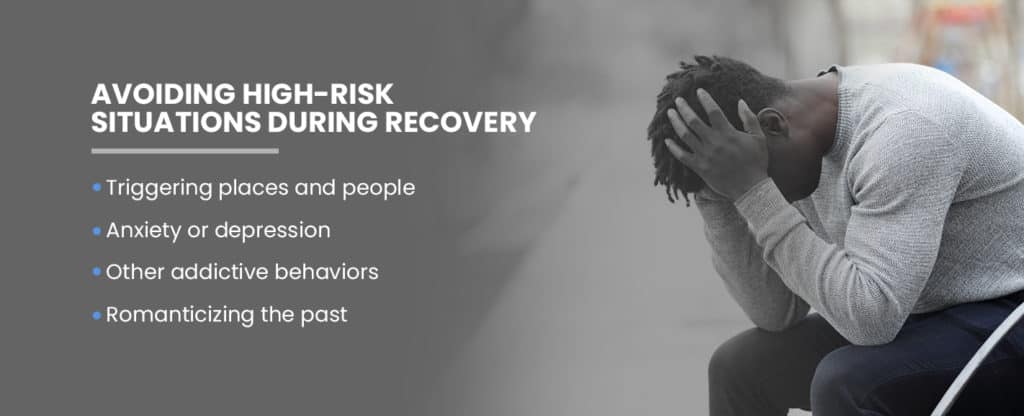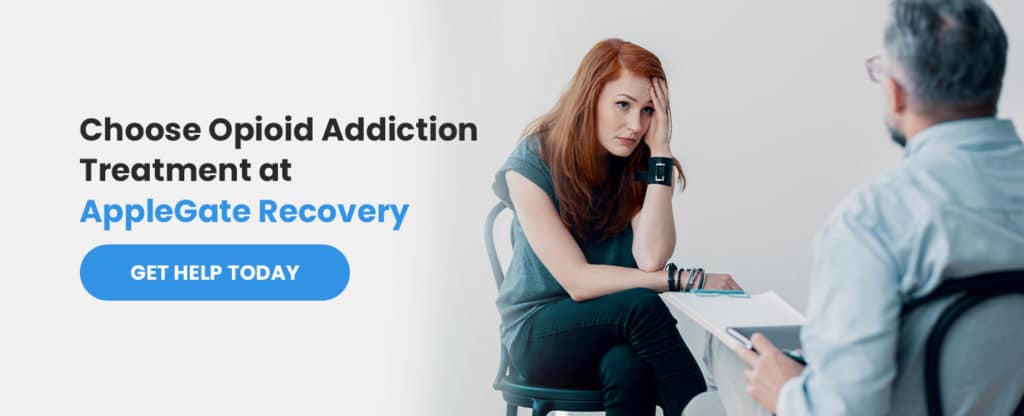
Learning to anticipate and assess risk in recovery is vital.
An essential aspect of maintaining recovery is understanding relapse risks and crafting a plan to deal with potential relapse triggers. If you are on the road to recovery, you will likely find yourself in situations that may challenge your goals. While avoiding these high-risk situations is ideal, it is not always feasible in real life.
The first step to understand your triggers and to learn how to recognize high-risk situations during recovery. Understanding potential triggers can help you avoid them where possible.
Sometimes, avoiding risky scenarios in recovery that act as a trigger isn’t possible. In situations like this, it is crucial to have a relapse prevention plan and seek help from your support system.
What Is a High-Risk Situation?

A high-risk situation is any situation that can negatively impact your recovery process or threaten your recovery. Staying drug-free after treatment can be difficult, especially when a trigger or challenging situation occurs.
High-risk situations can be physical surroundings or an emotional response to a situation that jeopardizes your journey to recovery. While it may not always be clear at the moment, there are several layers of risk severity. The three categories include low-risk, moderate-risk and high-risk, that a situation may pose to your recovery.
Low-risk situations: While the low-risk situations aren’t the most demanding scenarios, it is essential to be aware of these potential scenarios. A common low-risk situation may involve revisiting a place you frequented when you were not on your recovery journey. Moments like this can bring back negative emotions that may be difficult to handle.
Moderate-risk situations: A moderate-risk situation poses more danger and can be challenging to approach constructively without a plan in place. Common moderate-risk situations may be visiting an old friend with whom you previously misused substances. Even if they are also in the recovery process, it can be hard not to associate previous instances with them.
High-risk situations: High-risk situations are the most difficult to deal with, as they often trigger strong emotional or physical responses. A common high-risk situation that you may face is being in a place where another person is misusing a substance. It is best to plan how to leave these situations safely and quickly and seek guidance from your support system.
High-risk situation examples include:
- Replacing your drug of choice with a different mind-altering substance
- Dwelling on past mistakes and ruminating
- Romanticizing about the past when you were actively using
- Stress at home or work
- Thoughts about moderating substance use
- Self-pity when small things go wrong
- Having large sums of cash at your disposal
- Ignoring signs of anxiety and depression
Relapse Prevention Strategies

The most critical aspect of high-risk situations is identifying them before you find yourself in them. You’ll also want to plan how to approach a situation if necessary.
In some cases, a friend or support group can be an asset to said plan. A solid support system can hold you accountable and help you stay strong if a high-risk situation occurs.
- Conflict: Conflicts can increase the potential for a negative mindset or mood and raise your overall risk for relapse. It is best to avoid personal conflict wherever possible to ensure a healthier and positive attitude.
- Negative mindset: A negative attitude can increase the potential risk of relapse for patients in recovery. Stress and negative emotions happen during the recovery process. While these emotions are unavoidable, it is important to learn healthy coping mechanisms to deal with them appropriately.
- Peer pressure: Social gatherings are fun in recovery, but if you find yourself among people who still misuse substances, peer pressure can occur. Peer pressure can be difficult for anyone to handle, especially someone in recovery.
Avoiding High-Risk Situations During Recovery
Numerous high-risk situations may be challenging for those in recovery. Correctly identifying potential high-risk situations before they occur is an essential part of maintaining recovery. If you do find yourself in a high-risk scenario, you’ll want to have an effective plan you can implement to maintain your recovery and remove yourself from the situation.
- Triggering places and people: Certain situations and people may pose a high risk to those in recovery. If someone is in recovery and visits a place or person they previously associated with substance misuse, it may pose a higher risk for relapse. A job may also be a place where you’re likely to experience triggers. Overcoming workplace triggers can help you throughout your recovery journey.
- Anxiety or depression: Some people may turn to substance use if they are dealing with complicated emotions, including anxiety and depression. Some people may turn to misuse of a substance to dull negative feelings or emotions.
- Other addictive behaviors: When someone is in recovery, they may adopt other addictive behaviors to satisfy themselves. For example, some patients in recovery may take up gambling or overeating to fill the void of no longer misusing substances.
- Romanticizing the past: It can be easy to view the past more positively than how it occurred. When someone in recovery does this, they may think misusing a substance won’t have severe ramifications.
How to Develop a Relapse Prevention Plan
A relapse prevention plan can help you determine how to react if you find yourself at risk of relapse. A prevention plan will help you calmly address a high-risk scenario and take appropriate actions to ensure your continued recovery process.
- Identification: The first step to developing a relapse prevention plan is identifying and understanding relapse risks. Identification is vital in helping you respond appropriately to a tough situation. Once you identify a high-risk scenario, you can plan how to react accordingly.
- Assessment: After identifying a complex scenario, the next step is to assess your surroundings and situation. Assessing a situation can help you further identify things or people that may worsen a trigger for you. It is smart to note a way to exit or withdraw from the situation during the assessment stage.
- Exit: If a high-risk situation puts your recovery in jeopardy, you should leave this situation. Whether it is physically removing yourself from the immediate room by going to the bathroom or fully exiting the building, the distance between the situation and yourself can provide you with the ability to think more clearly.
- Support group: A solid support system is ideal for anyone going through the recovery process. If you have just left a high-risk situation, calling a trusted friend or family member can be a great option to talk about any complicated or negative emotions you’re feeling. A support group can help you ground yourself, remain calm and discourage any potentially dangerous actions. Being happier and healthier through recovery with a support group can lead to a more effective recovery journey.
- Follow up: If you’re still in a negative mood after a high-risk situation, it is a good idea to follow up with a doctor or counselor. A visit with a counselor can provide a great opportunity to safely discuss the situation and any thoughts or emotions it may have brought on.
Choose Opioid Addiction Treatment at AppleGate Recovery
At AppleGate Recovery, we prioritize helping patients recover so they can lead safe, happy and healthy lives. We offer innovative treatments, allowing patients to focus on their goals and improve one step at a time. Our team of experts provides a safe environment for patients to talk through difficulties they may face during medication-assisted treatment.
To learn more about opioid addiction treatments and recognizing high-risk situations, call 888-488-5337 or contact us on our website today.

